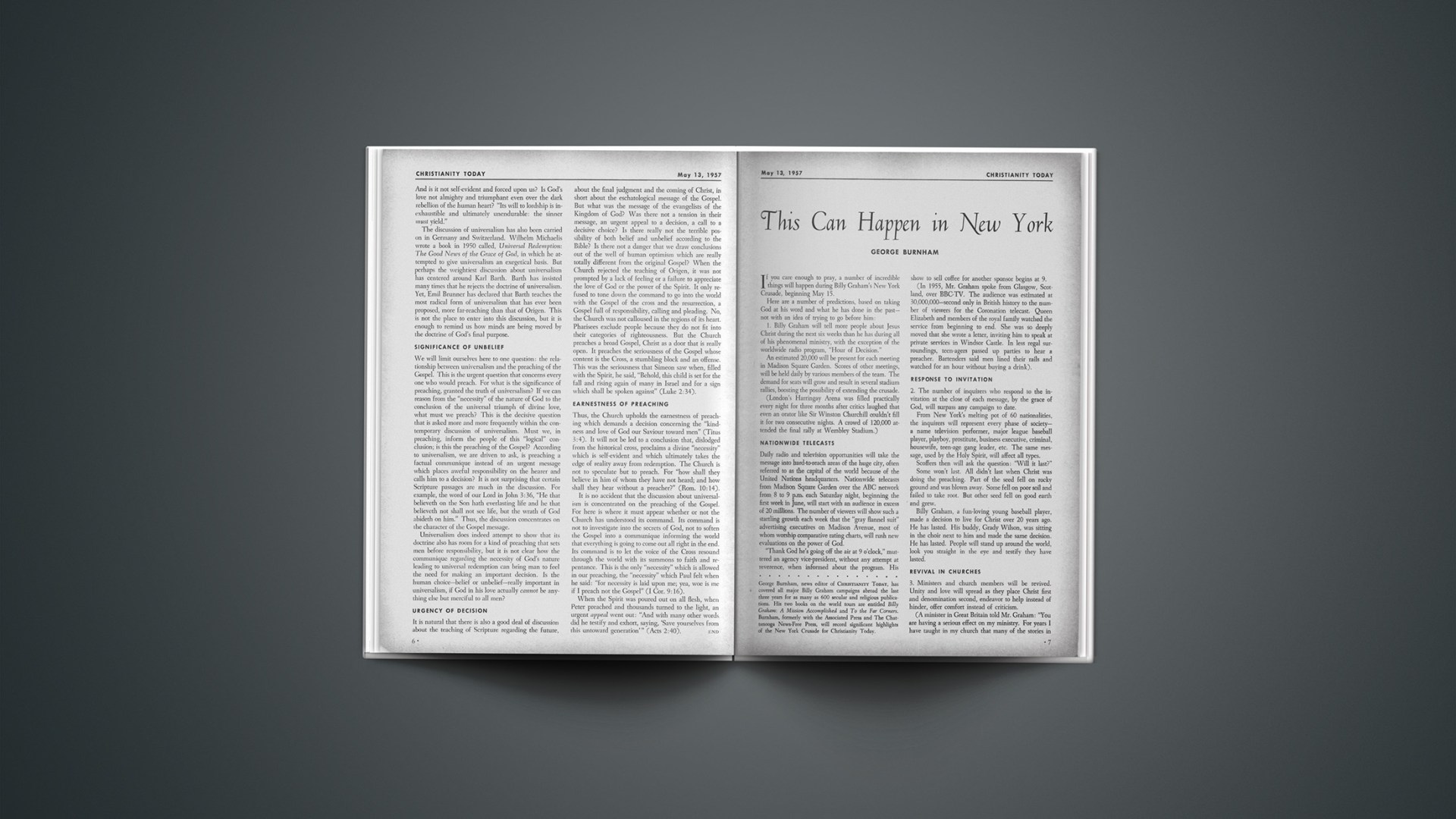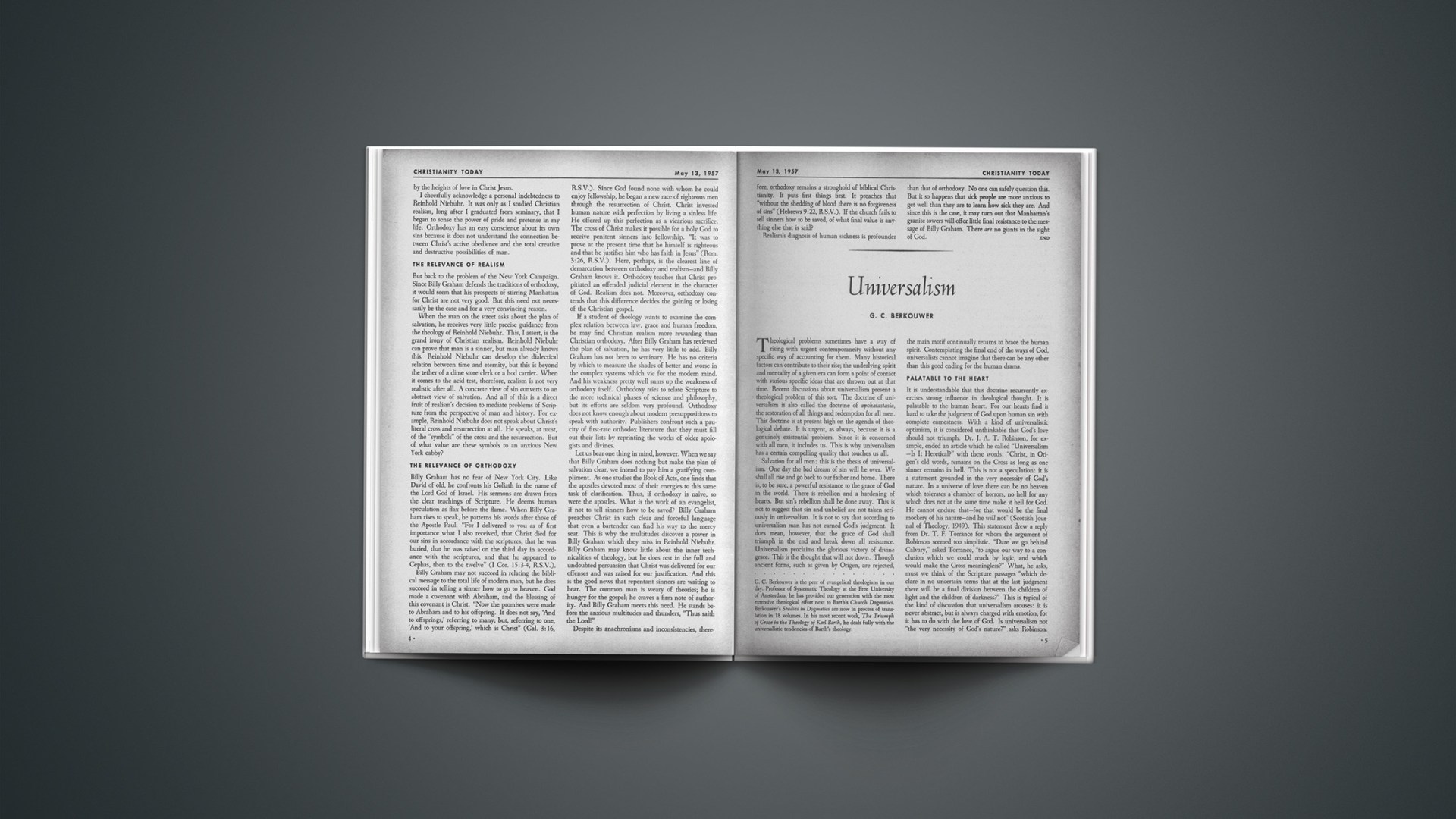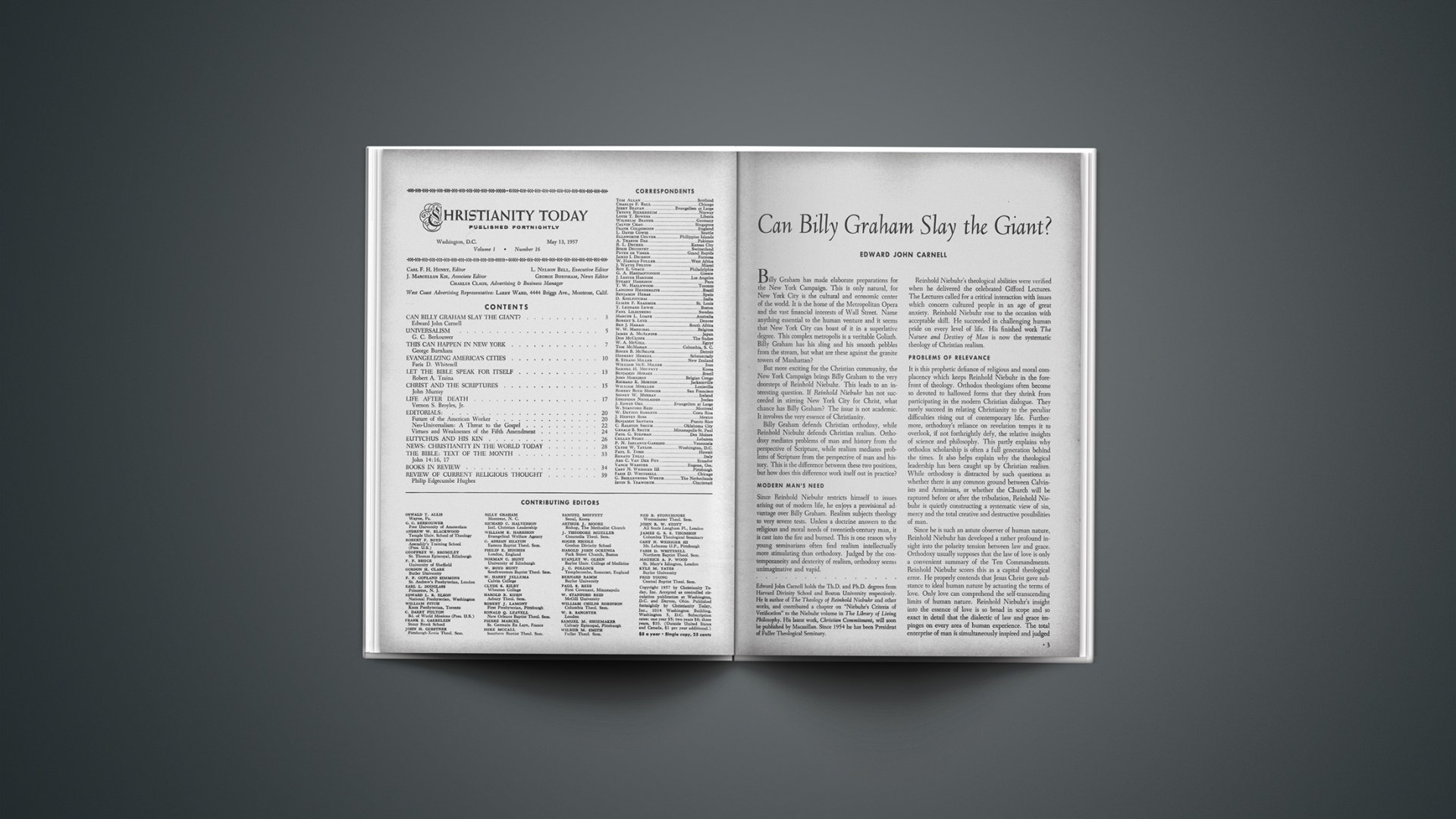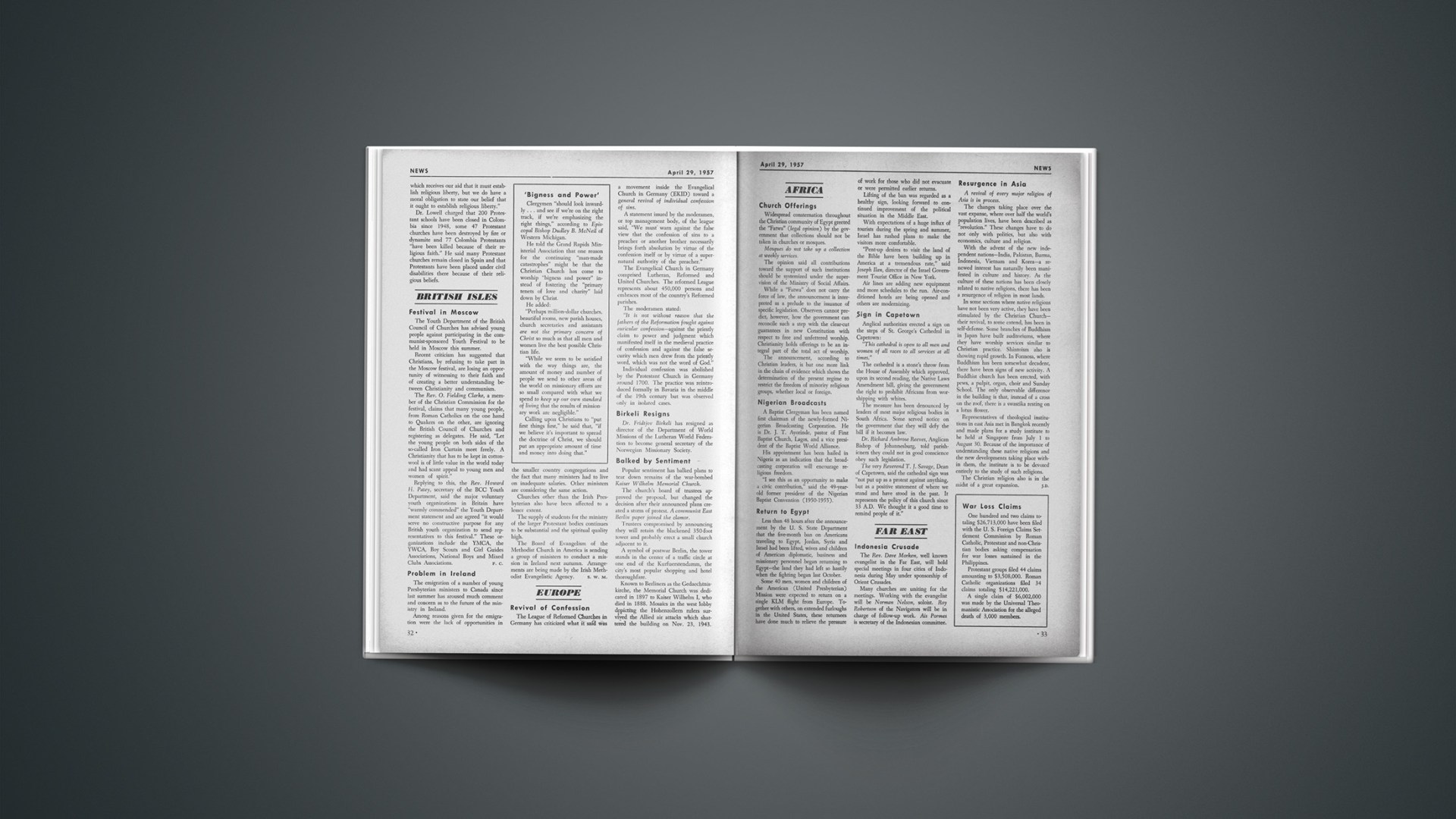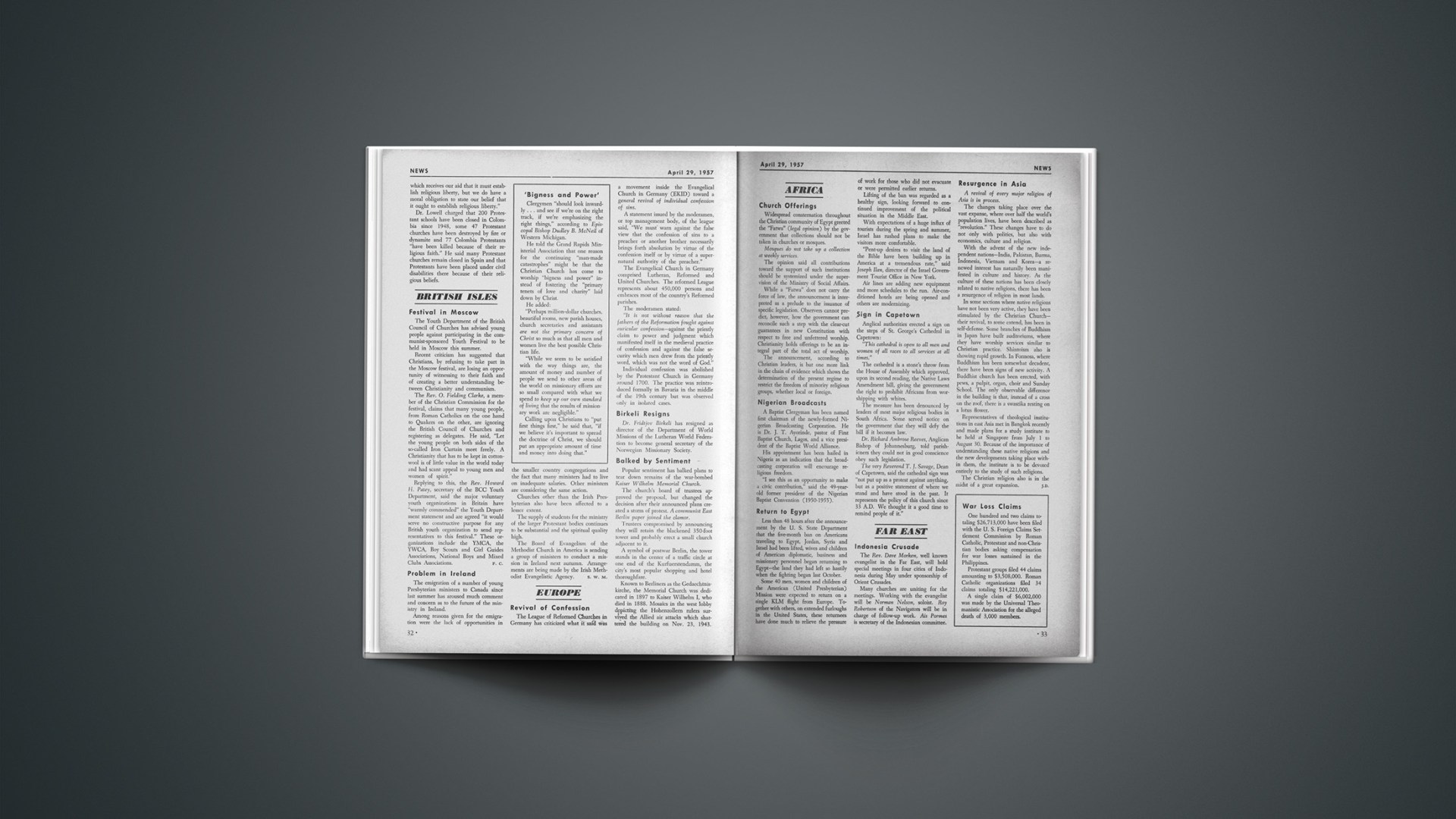America has become an urban nation. This change, from rural to urban dominance, has proceeded with ever-quickening pace through the last century. In 1850, the population of the United States was only 15.3% urban; by 1920 the figure had jumped to 51.2%. In 1950 it was 64%, and today it is approximately 67%.
Virtually saturated cities are now bulging into their suburbs. For example, Chicago’s population in 81 suburbs increased 35% in five years following the 1950 census. The United States not only has five cities of over a million population, and 14 metropolitan areas of over a million each, but it contains 103 cities of between 100,000 and 1,000,000 inhabitants; 127 of between 50,000 and 100,000; 266 of between 25,000 and 50,000.
God’s Concern For Big Cities
If our nation is to be evangelized, we must reach these urban areas. We dare not neglect the metropolitan masses. In Jonah’s day Jehovah was concerned over Nineveh, “that great city wherein are more than six-score thousands [120,000] persons that cannot discern between their right hand and their left hand and also much cattle” (Jonah 4:11). Jesus had compassion for Jerusalem: “And when he was come near, he beheld the city and wept over it” (Luke 19:41). The major item in Paul’s first-century evangelistic strategy was to evangelize the important city centers and to plant churches there before moving on.
Difficulties rise mountain-high in the path of an urban program of reaching the lost. The mobility of city dwellers makes them hard to find, hard to reach and hard to hold. People find it easy to isolate themselves and to dodge religious responsibility when they live in the city. The sense of loneliness, the constant tension and the discouraging frustration of city life cause many to plunge deeply into worldly amusements, drinking, gambling, immorality and even drug addiction. Thus, they easily become Gospel-hardened slaves of Satan.
Obstacles Require Multiple Effort
City life is so complex with its variety of racial groups and social strata that any single thrust is hardly enough. Moreover, our cities are beset with false cults and inadequate religions that oversow the field with tares to offset the evangelistic approach. Roman Catholicism is strong in our major cities. The 1956 official Catholic directory claims 1,899,357 Catholics for the Chicago area; 1,490,229 for Boston; 1,458,240 for New York: 1,325,740 for Philadelphia; 1,179,469 for Newark; 1,125,000 for Detroit, and 1,075,000 for Los Angeles.
While we cannot hope to win a large city 100% to Christ and evangelical allegiance, yet the writer believes that it is possible so to saturate a city with Christian witnesses and to make such a Gospel impact that every normal individual will be challenged and the city evangelized.
How can we do it? The writer does not suggest adding more agencies but rather revitalizing and empowering those we have. The breath of God in mighty revival across our land would do it! But while we pray, wait and work for that, we must do all we can to reach the city multitudes on their way to hell. Not more man-made machinery but more Holy Spirit power is the need.
For convenience, we can examine all existing evangelistic efforts in our cities under four headings.
The Local Church Thrust
Evangelism is the primary responsibility of every evangelical congregation. Every local church must work to carry out the Great Commission (Matt. 28:18–20). There were 273,508 Protestant churches in the United States in 1950, enough to evangelize each city quickly and thoroughly—if God’s people would launch out earnestly and sacrificially to do it.
Most local churches lack a view to aggressive evangelism. Each church should have an evangelistic committee of three, five, seven or nine burdened Christians who are not loaded with other duties. This committee should study the church’s past evangelistic record, what it is doing now, what its evangelistic responsibilities are and how other churches are doing the job. With this information, the committee can make intelligent and effective recommendations to the church and all its organizations for bigger and better evangelism.
Evangelistic Task Force
The evangelistic committee should see that the church has an efficient and growing prospect list; that Sunday services are geared to evangelism; that the Sunday School faces its evangelistic opportunities; that a permanent program of lay evangelistic calling is in operation and that the prayer power of the church supports its evangelistic program. This committee should retain every possible means of soul-winning—radio, clubs for boys and girls, the vacation Bible school and summer camping. Christian literature should be widely distributed. The use of church buses, deputation teams and outdoor meetings could be emphasized. Advertising, family worship programs and extension work in new housing areas, hospitals, jails and institutions are of vital importance. Occasional evangelistic campaigns in the home church produce inspirational results.
If every local church, depending on its size, would attempt to evangelize faithfully every person within a radius of one-fourth mile to one mile from its walls, the territory in every city would be covered.
The Denominational Thrust
The major Protestant denominations have a history, a size, a standing, an organization and an over-all bulk that cannot be discounted when it comes to evangelistic impact. By marshalling the strength of its member churches a denomination can accomplish evangelistic feats virtually impossible otherwise.
The major Baptist groups of the United States are planning a joint evangelistic effort to begin in 1959 and to run for five years, the climax to be reached in 1964 with the 150th anniversary of organized Baptist life in this country. If these Baptist groups could actually get together for such an effort, backing it with all-out praying, preaching, personal witnessing, advertising and organizing, we might see the United States swing into the Baptist column numerically. And what Baptists could do, any other major denomination might do.
The larger denominations have departments of city church work which do significant work wrestling with city church problems, particularly that of city evangelism. Denominations are able to foster new churches in our mushrooming suburban areas better than any other agency, but they should be doing more.
Neglected Downtown Churches
Upon denominations largely rests the problem of aiding and encouraging struggling inner city churches saddled with huge buildings and declining memberships. Often these old inner city churches are in the midst of more people and greater needs than ever before, and without their evangelistic ministry paganism closes in on a big mass of people.
Many of the social service ministries with indirect evangelistic influence must look to the denominations for support. Among these are settlement houses, work among foreign groups, student projects, and chaplaincies in public institutions.
Roman Catholics specialize in hospitals in our cities. We need more hospitals under the sponsorship of evangelical denominations. Southern Baptists have done a good work through hospitals in the larger southern cities. But we know of only one local church (First Baptist in Evansville, Illinois) able to own and operate its own hospital. Christian hospitals condition their patients for the evangelistic approach.
Denominational radio and television programs are able to reach many city dwellers with the Gospel. An independent Gospel broadcaster needs a long time to buildup the respectful and responsive listening audience that a denomination has to start with. Lutherans, Southern Baptists, Free Methodists, Mennonites and a few others are doing a good job in the broadcasting field.
When we remember that about 90% of Protestant church members in America belong to just eight or ten leading denominations, we can understand what evangelistic impact these denominations might have, both on urban and rural areas, if they all threw their whole weight into evangelism and missions.
The Interdenominational Thrust
When denominations keep on an evangelical and evangelistic footing, they can make a tremendous impact by cooperative effort. The National Council of Churches of Christ in America is the cooperative agency of about 30 Protestant denominations. While its theology may not be as biblical and evangelical as we wish, yet we must recognize that it does have a department of evangelism which prints literature, maintains radio and TV programs and supports certain types of mass evangelism. Affiliated with the National Council are local councils of churches in practically every American city. It is encouraging to note that these local councils or federations have been backing the Billy Graham campaigns.
If evangelicals, without compromise of theology or conscience, could make their weight felt and voices heard for evangelism in local church councils, a great deal more might be done toward evangelizing our cities. Often the National Council affiliate is the only organized interdenominational channel through which we may evangelize.
The National Association of Evangelicals is another interdenominational organization, conservative in theology and evangelistic in spirit. Among the smaller Protestant communions it has done and is doing a fine work for evangelism, missions and other interdenominational projects.
In addition, the American Bible Society is an interdenominational organization deserving the support of all evangelicals. It accomplishes the basic evangelistic task of putting the printed Word of God into the hands of the people. During 1955 it distributed 14,918,343 volumes of the Scriptures in the United States and abroad. Since its founding in 1816, it has made available nearly one-half billion copies of the Scriptures. Many city people do not possess a Bible. A good evangelistic activity would be to put a Bible or New Testament into the hands of every person who would promise to read it.
Evangelicals might well give thought to the Young Men’s Christian Association. This interdenominational organization was originally evangelical and evangelistic. Its facilities in most cities may still be used by evangelistic organizations and some of its staff members are evangelical Christians. If we could somehow reclaim and redeem every local “Y” for Christ and evangelism, we would do much to reach the boys and men of our cities.
The Independent Thrust
We include in this category all organizations, groups and individuals operating without specific denominational backing but supported by Christians from many denominations. Our century has produced a multitude of independents in the field of city evangelism. If older denominations had remained true to the Bible and to their original doctrines, perhaps most of the independents never would have arisen. But they are here and are doing a big work.
The Bible institute movement belongs to the last 75 years. Every major city in the United States has one or more Bible institutes, and nearly all of them are independent. The total weight of these schools is on the side of grass roots evangelism in the streets, hospitals, jails, factories, missions and churches of our American cities. Every student is trained to be a personal evangelist and a supporter of every sound evangelistic cause. Where American Christianity would be today without the influence of the Bible institutes, it is hard to say.
The rescue mission movement seeks to reach the inhabitants of skid row. Every city has one or more rescue missions to reach these socially disinherited people. Chicago alone has some 25 rescue missions. All could use more financial support, and if to the staff of each mission could be added a Christian doctor, a Christian psychiatrist and a Christian social worker, its power to reach and hold more men and women would be evident.
The Gideons, a traveling men’s organization, seek to put the Bible into the hotels, motels, hospitals and schools. These Christian men are nearly all personal soul-winners. They have done a splendid work.
The Christian Business Men’s Committee International has its group of organized laymen in every citv of any significant size in our land, with many branches abroad. The big burden of CBMCI is to win fellow business men for Christ. This they do through breakfasts, dinners, evangelistic meetings, service men’s centers, distribution of tracts and Gospels and personal evangelism.
Youth for Christ has enjoyed the blessing of God in its evangelistic emphasis. Some of our leading evangelists got their start in Youth for Christ, and thousands of young people have not only been saved through this organization but have dedicated their lives to full-time Christian service. The Hi-C clubs affiliated with Youth for Christ have some 2,000 Bible study clubs in high schools across the country, reaching about 25% of our high schools. Hi-C alone reports some 23,000 high school youth won for Christ last year.
Press And Radio Media
The independent tract publishers such as American Tract Society, the Good News Publishing Company and Moody Press are doing a needed operation in furnishing and distributing evangelistic tracts.
Independent gospel broadcasters, such as Charles E. Fuller, have large listening audiences, and many are turned to Christ both in the cities and country areas. No better means of reaching a total city population has ever been found than broadcasting. Chicago will certainly be under heavier judgment than ancient Chorazin and Bethsaida (Matt. 11:21) if it rejects the Son of God, after having Moody Institute’s WMBI broadcasting the Gospel to it every day for over 25 years.
The Child Evangelism Fellowship seeks to win the children not otherwise being reached for Christ. Christian women open their own homes and invite in the neighboring children to sing choruses, learn Scripture passages and hear simple gospel messages. This organization has world-wide scope.
Inter-Varsity Christian Fellowship endeavors to reach the students on college campuses for Bible study, Christian fellowship and evangelistic projects.
Future Prospect For Evangelism
What more can we say? Time and space prohibit a discussion of the many additional aids to evangelism today—the independent evangelists, evangelistic bands, personal workers groups, Christian publishers, radio stations, churches, tabernacles, gospel halls and Salvation Army citadels, all trying to win the lost in our cities to Christ.
How can we do the job better? More spiritual power is the big need! Let all in these four classifications repent of liberalism, unbelief, worldliness and materialism, wherever these exist, whether in the local church, denominational, interdenominational or independent groups. Let denominational bigotry, rivalry and pride be put away; let group and individual jealousy, bitterness, narrowness and carnality be renounced.
Let us all love God with all our hearts and our neighbors as ourselves; let us pray more, give more, witness more, love one another more, help one another more and join our hands and hearts in evangelizing our cities while we may.
Faris D. Whitesell has served on the faculty of Northern Baptist Theological Seminary for more than 30 years, from 1925–44 as Professor of Evangelism and since 1944 as Professor of Practical Theology and Homiletics. He holds the A.B. degree from William Jewell College, M.A. from Loyola University and Th.M. and Th.D. from Northern. He is author of a number of books in the sphere of practical theology.



